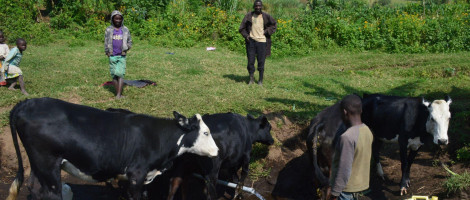Hunger Offering cultivates crops, community, church in Democratic Republic of the Congo
by Guest Author on July 17, 2018 in Hunger Offering

By Jaclyn R. Bonner
In a country where severe food insecurity increased by 30 percent last year, affecting 7.7 million people, imagine reducing chronic malnutrition among the most vulnerable -- pregnant women, children under 5 years old, and the elderly -- and creating food security for rural communities in one of the world’s least developed countries.*
These solutions do not come easily. Problems are complex in the Democratic Republic of the Congo (DRC). It is the second largest country in Africa and ranked seventh on the 2017 Fragile States Index.* Despite the nation’s instability and broken structures, the local church and leaders in the region have a vision for their people.
Deep in the heart of fertile Eastern DRC, 430 churches from three provinces are coming together to bolster a sustainable farming endeavor -- permaculture. Permaculture is an agricultural practice designed to break the cycle of poverty by diversifying crops, increasing control over production, and generating more income.
Permaculture promises holistic development
In Burungu, a remote area in the Nord Kivu Province, a local ministry partnering with the Baptist World Alliance and the Texas Baptist Hunger Offering has secured about 25 acres of land to start a permaculture training project.
Many farms use monoculture farming, which is the practice of cultivating only one crop. This hinders self-sufficiency by making farmers dependent on the seasonal weather, saturating the local market with the same product, and reducing income. It is a struggle to provide for basic needs like food and clothing, let alone school fees for children.
The permaculture training program increases local farmers’ seasonal income by 45 percent by maximizing productivity without hurting the environment, says the project leader, Mike Musafiri-Bugeni. It helps households create an “all-in-one system” of livelihood that incorporates housing, farming, gardening, animal production, water, and biogas systems in one location.
Hunger Offering funds assist purchase of necessary supplies for the training program, which will equip 100 clients per month, estimates Musafiri-Bugeni.
During the course they stay at on-site guest houses. Fresh food like milk, raw honey, vegetables, meat, and fish is provided for the visitors, relieving the familiar stress of food insecurity while they are learning.
Site production not only feeds visitors but also sustains the program. Eventually, the project will expand to different sites.
Cultivation of the community and church
While the ministry primarily teaches Congolese nationals to cultivate crops, it is also strengthening the community and church in Eastern DRC. People are already coming to Christ through the witness of ministry leaders like Musafiri-Bugeni.
“We are mixing relief and development. Both are helping our church to grow, though we are doing it with the support from other brothers and sisters from around the world. This is honoring our church,” said Musafiri-Bugeni.
Supporters of the Hunger Offering directly impact this agricultural development pilot project.
“Through your generosity we are sharing with our brothers and sisters,” said Musafiri-Bugeni. “We are grasping the opportunity to share the word of God and plant more churches in different remote areas in the region. The transformation is holistic for the clergy and people of the region as well.”
Texas Baptists is a movement of God’s people to share Christ and show love by strengthening churches and ministers, engaging culture and connecting the nations to Jesus.
The ministry of the convention is made possible by giving through the Texas Baptists Cooperative Program, Mary Hill Davis Offering® for Texas Missions, Texas Baptists Worldwide and Texas Baptist Missions Foundation. Thank you for your faithful and generous support.
Subscribe to receive stories like this one directly to your inbox.
We are more together.